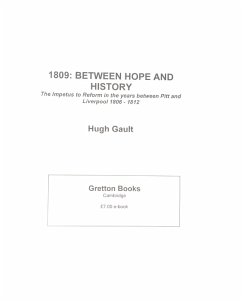Wellington's victories in the Peninsula were sandwiched between the humiliation of Cintra and the debacle of Walcheren. George III required a second inquiry report on the former, but was said to have been misled on the latter. The Napoleonic war had economic and social ramifications, as well as political and military ones. Riots and strikes continued. Trends included increasing urbanisation and improvements to the welfare of workers.This book addresses the implications, describing the Regency, Britain's assumption of a new place in the world and the impact of Robert Owen as trade unions and socialism developed.
People still had hope, but they were aware of history. Their optimism was tempered by recent revolutions in America and France, by war in Ireland, by continuing concerns over Napoleon's intentions, and by growing upheaval at home as the Industrial Revolution took hold. Expectations had changed, but would they be fulfilled?
While people had drawn some lessons from the past, they were still in the process of adapting to the future. Change would be constant after 1809, so the search for stability was doomed. It was replaced by a preference for predictability. Evolution was a more attractive option than revolution. After all, the alternatives had been experienced. In this context it was between hope and history.
See www.grettonbooks.co.uk/books-non-fiction/1809-2/
Dieser Download kann aus rechtlichen Gründen nur mit Rechnungsadresse in A, B, BG, CY, CZ, D, DK, EW, E, FIN, F, GR, H, IRL, I, LT, L, LR, M, NL, PL, P, R, S, SLO, SK ausgeliefert werden.









